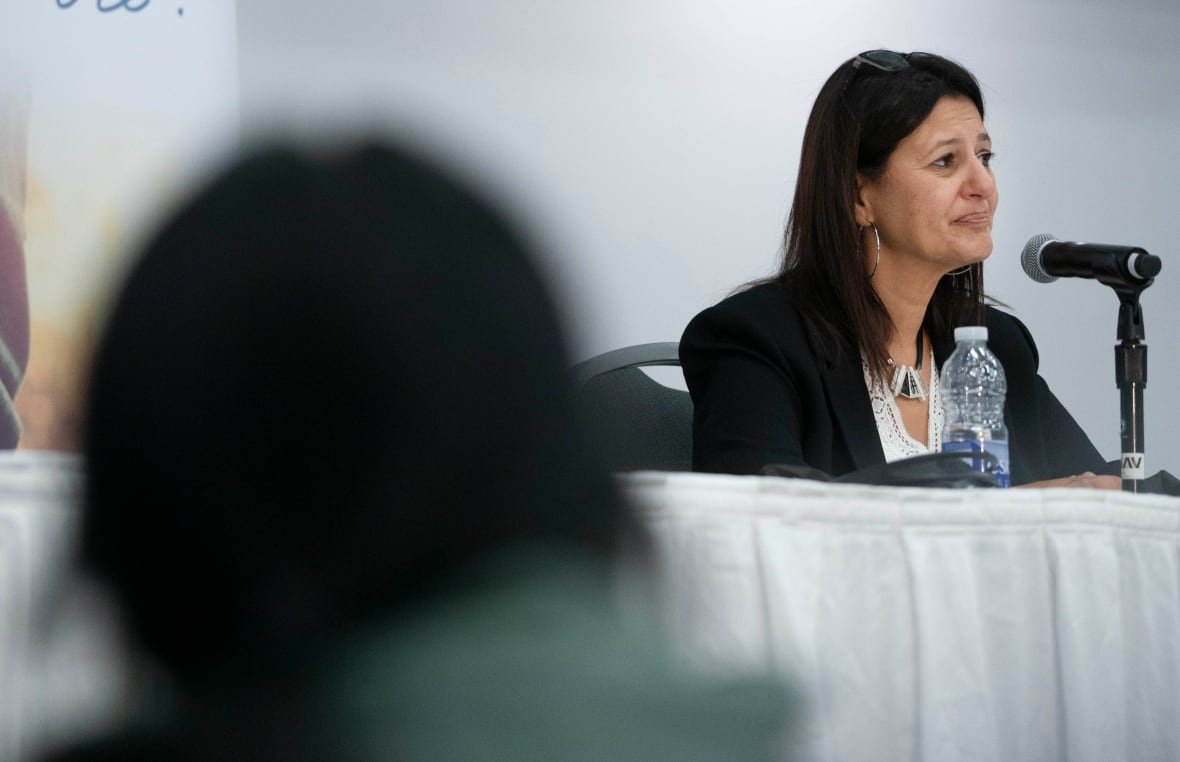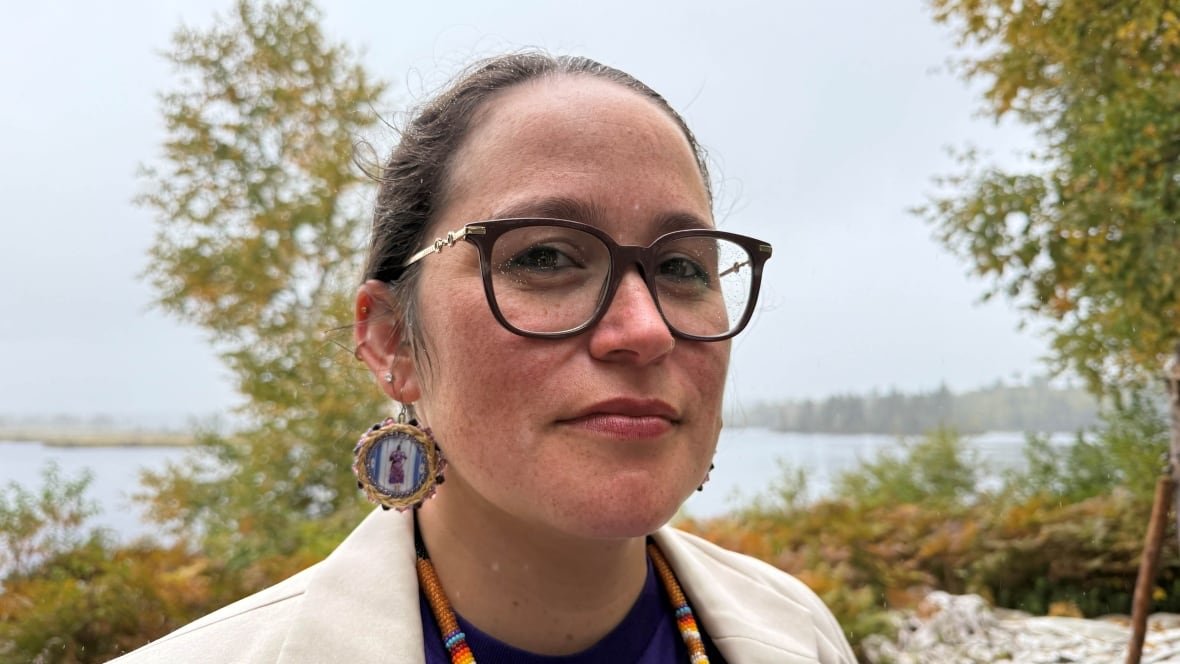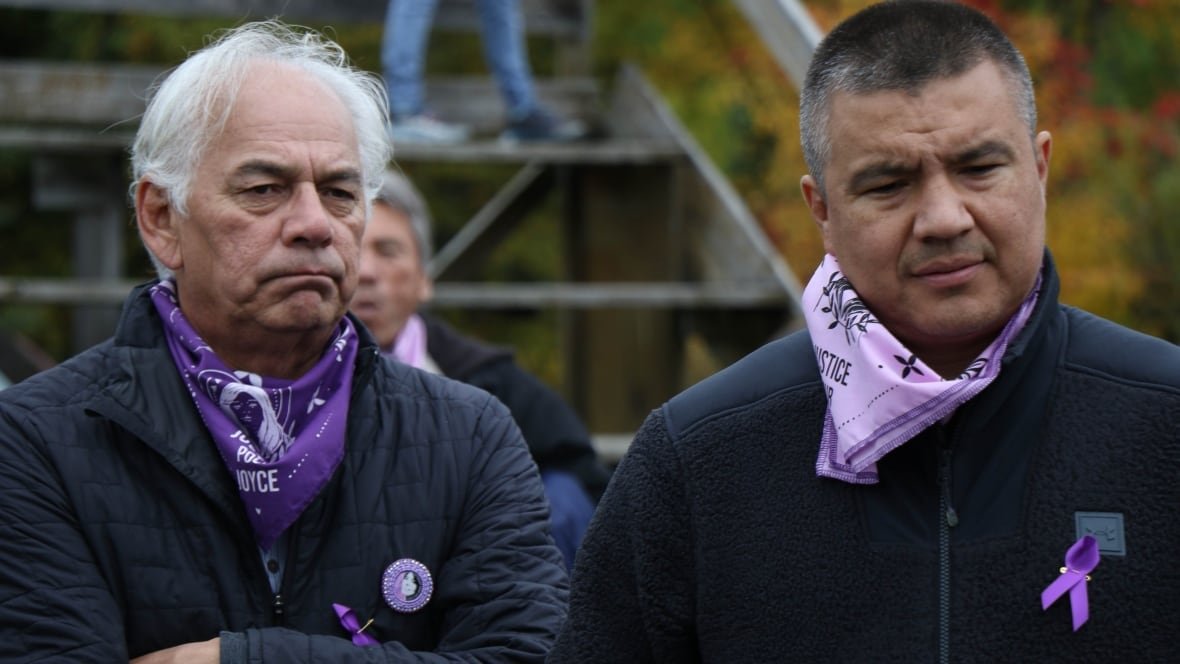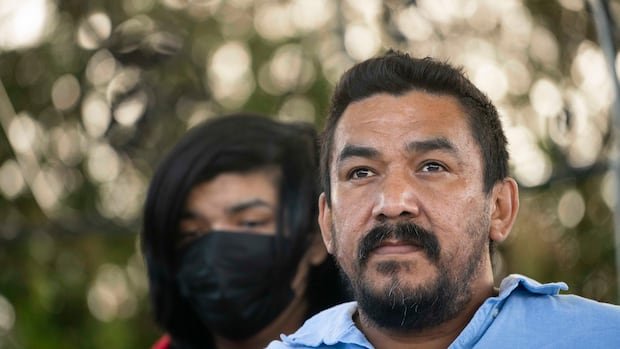Joyce Echaquan died because she was Indigenous.
Those were her grieving husband’s words from a statement he delivered to a crowd of journalists on Oct. 5, 2021, reacting to the release of a coroner’s report into Echaquan’s death.
Carol Dubé spoke calmly but his pain was unmistakable as he described “a system that still allows people filled with prejudice to commit horrors.”
Earlier that day, coroner Géhane Kamel, who fought back tears as she detailed her investigation’s findings, said she believed Echaquan would have still been alive if she was white.
Echaquan died on Sept. 28, 2020 at the Centre hospitalier régional de Lanaudière in Joliette, Que., about 90 kilometres northeast of Montreal.
The death of the 37-year-old Atikamekw mother of seven from the community of Manawan and the shocking racist behaviour from hospital staff she managed to livestream even as she cried out in agony sparked outrage and protests.
The fact that she died just a few months after George Floyd was murdered amplified the conversation around systemic racism in Quebec.
Five years later, that conversation is far from over. And changes stemming from her death are still just beginning.

The birth of Joyce’s Principle
Echaquan died almost exactly one year after the Viens Commission report was published.
The commission was the result of more than nine months of testimony about the abuse, mistreatment and neglect endured by Indigenous people from police, the health-care system and other public services.
At the time, Sébastien Brodeur-Girard, who was part of the Viens Commission’s research team, hoped the exhaustive proceedings — during which 237 people came forward, telling nearly 1,200 stories over 38 weeks — would serve as an “electroshock” to Quebec society.
“But it wasn’t the case. Joyce was the electroshock,” he told Radio-Canada’s Espaces autochtones.
In fact, many people from Manawan testified at the Viens Commission about problems they encountered at the hospital in Joliette.
“The pattern existed before, but Joyce’s death really solidified things,” Brodeur-Girard pointed out.
Joyce Echaquan’s husband, Carol Dubé, said Tuesday he believes his wife died because she was Indigenous. His comments echoed those made by Quebec coroner Géhane Kamel, who said at a Tuesday news conference in Trois-Rivières, Que., that she believed Echaquan would still be alive today if she were white.
Echaquan died of pulmonary edema.
The coroner concluded that racism played a role in preventing the late patient from receiving the care she was entitled to.
Shortly after Echaquan died, Joyce’s Principle was born.
It is a 16-page document created by the Council of the Atikamekw Nation and the Atikamekw Council of Manawan which “aims to guarantee to all Indigenous people the right of equitable access, without any discrimination, to all social and health services, as well as the right to enjoy the best possible physical, mental, emotional and spiritual health.”

The principle, inspired by the United Nations Declaration on the Rights of Indigenous Peoples, is at the heart of a two-day event organized by Joyce’s Principle Office. It is taking place this weekend in Trois-Rivières, Que., to mark the fifth anniversary of her death.

On Saturday, a long list of guests from fields like health, law and politics took part in a series of roundtables and workshops.
According to Jennifer Petiquay-Dufresne, the executive director of Joyce’s Principle Office, “adopting Joyce’s principle is not a finality in and of itself,” but rather a starting point.
“We have to make it live in our organizations, in our politics and our reflections on future services,” she said.
“We have to look at different fields and fulfil some action in all of those fields to have real and concrete positive results.”
In addition to Saturday’s event in Trois-Rivières, there is a tribute ceremony for Echaquan planned for Sunday afternoon.
After Joyce
Petiquay-Dufresne said there has been change in the ways the province’s health-care system interacts with many Indigenous people, especially in the Lanaudière region where Echaquan died.
But Petiquay-Dufresne who, like Echaquan is from the Manawan community, added that based on what she hears from community members, there is still a lot of work to do and many people still feel discriminated against in health-care settings.
“When they say something, they feel like it’s not believed or they have prove what the point of their visit is because there are assumptions that they are maybe drunk or drugged. And they’re not treated the right way,” she said.
“The racism and the discrimination against Indigenous people, they’re still there. I can say work is ongoing … and we have to do it together.”
Several other people interviewed by Radio-Canada’s Espaces autochtones unit pointed out notable changes since Sept. 28, 2020 — including substantial increases in government funding for health-care initiatives, despite stating that the situation remains far from ideal.
For example, according to Radio-Canada, the budget for the Native Friendship Centre went from $500,000 in 2018 to $3.5 million this past year, and its staff grew from about 12 people to 37, excluding external resources such as speech therapists and psychologists.
Last year, a mobile clinic for Indigenous patients in the Lanaudière region was launched. It’s believed to be a first in the province.
The mobile Mikinakw clinic offers a range of services. The group behind it says there’s still trust to rebuild in the health-care system, four years after Joyce Echaquan’s death at the Joliette, Que., hospital. A coroner determined her death was influenced by racism.
Ghislain Picard, the former chief of the Assembly of First Nations Quebec-Labrador (AFNQL), told Espaces autochtones that dialogue with the government on the health-care system’s failings have been more engaging.
But several government initiatives have raised concerns.
In 2021, the province made an Indigenous sensitivity training program available to heath-care workers, though, at the time, many people said the training, which was initially designed for civil servants, missed the mark.
Last December, the National Assembly adopted Bill 32 to enshrine the notion of cultural safety in health-care facilities for Indigenous people.
Even as the bill was being reviewed, First Nations groups expressed anger and frustration over how the bill was drafted, in part because of what they said was a glaring omission: the failure to recognize the existence of systemic racism, a fundamental component of Joyce’s Principle.

No government recognition of systemic racism in sight
In 2020, the City of Montreal formally recognized the existence of systemic racism and so did the province’s Order of Nurses in 2021 and many organizations after that.
Kamel, the coroner who investigated Echaquan’s death, urged the province to follow suit.
But for more than five years, the Legault government hasn’t budged.
In an interview with CBC News, Ian Lafrenière, the minister responsible for relations with First Nations and Inuit — who will attend Sunday’s tribute ceremony for Echaquan in Trois-Rivières — said it was “impossible” to fully implement Joyce’s Principle into the cultural safety law.
“The first criteria they asked from me is to recognize systemic racism. So, I’ll be honest, I’ll be straight and honest, it was impossible,” he said.
“But that didn’t stop me from doing something. In Bill 32, I put everything else [from Joyce’s Principle] in my bill.”
The minister also stressed that the province is doing what it can to create change but it won’t happen overnight.
“It’s never going to enough, to be honest. Why is that? [Because] you can’t catch up 400 years of history [just] like that,” said Lafrenière.

In a statement to CBC News, the province’s Health Ministry said it is committed to continue its work on cultural safety and to take into account “the realities and cultures of First Nations and Inuit” in its offer of health-care services.
It said an additional training module designed specifically for health-care workers has been available since March of last year.
According to the ministry, a total of 47 positions for both liaison officers and service navigators will be funded for 2025-2026 and people in those roles will help facilitate relationships between communities and health-care establishments.

‘Duty of memory and a duty of action’
For many people, the lack of recognition of systemic racism remains a massive obstacle to true change.
In an open letter to Premier François Legault published on Saturday by Radio-Canada’s Espaces autochtones unit, Sipi Flamand, the chief of Manawan, wrote that Joyce’s Principle isn’t just some “symbolic option,” it’s a “concrete tool recognized by experts and supported by our communities.”
“Applying Joyce’s Principle would allow to get our respective peoples closer to each other so that, finally, First Nations can feel like they are part of Quebec society. I have to believe that is something you would want,” Flamand wrote.
“We will no longer accept silence, half measures or empty excuses. The Atikamekw, and all those who believe in fairness and justice, expect clear and immediate action. Applying Joyce’s Principle will be part of your political legacy and will pave the way for reconciliation. She cannot have died in vain.”
The Legault government is about to enter the final year of its second mandate.
Petiquay-Dufresne says she’s not holding her breath about the current government reversing course on the issue of systemic racism. She’s now hoping a future government will approach this issue differently.
“With the death of Joyce, I think we have a duty of memory and a duty of action,” she said.
“I don’t think we’re fulfilling our duties right now with the tools that we have. But I think [her death] woke up a lot of people.”
With files from Radio-Canada’s Espaces autochtones, CBC’s Cathy Senay, Rachel Watts and Hénia Ould-Hammou.



